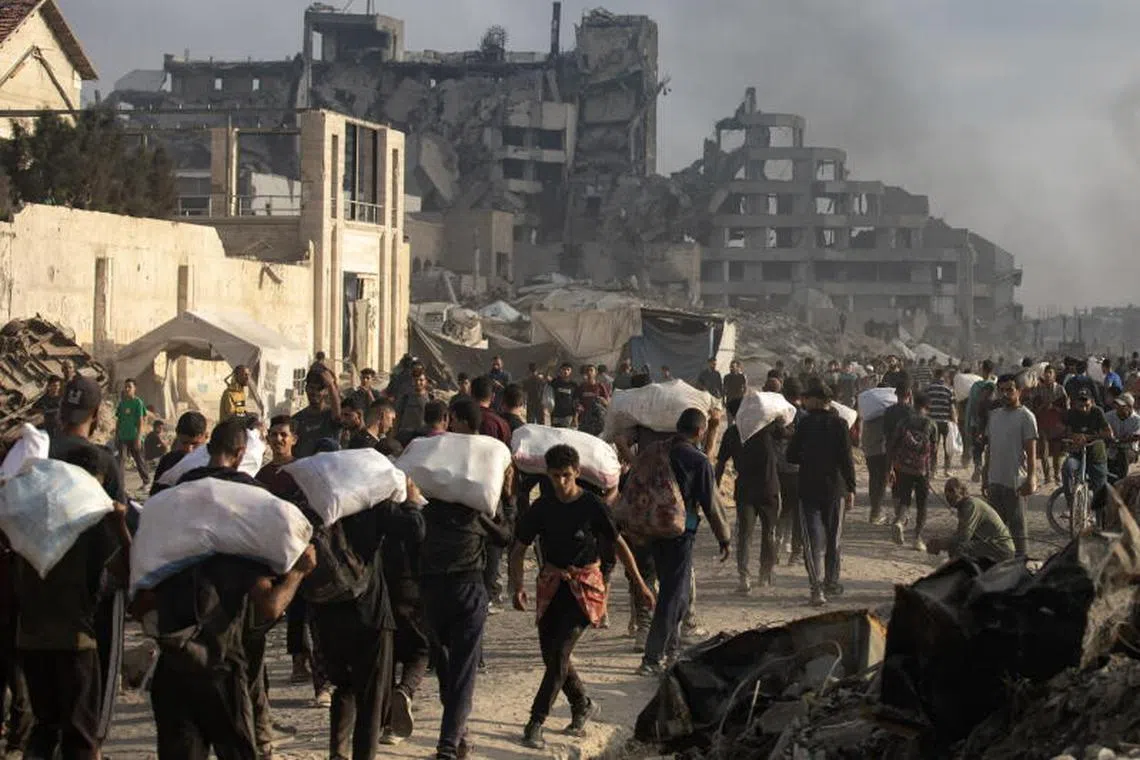Israel acknowledges Palestinian civilians harmed at Gaza aid sites, says ‘lessons learnt’
Sign up now: Get ST's newsletters delivered to your inbox

Displaced Palestinians carrying relief packages along Rashid Street, west of Jabalia, in the Gaza Strip on June 22.
PHOTO: EPA-EFE
Follow topic:
The Israeli military acknowledged on June 30 that Palestinian civilians were harmed at aid distribution centres in the Gaza Strip, saying that new instructions had been issued to Israeli forces following “lessons learnt”.
Since Israel lifted an 11-week aid blockade on Gaza on May 19 allowing limited UN deliveries to resume, the UN says more than 400 Palestinians have been killed while seeking handouts of aid.
“Following incidents in which harm to civilians who arrived at distribution facilities was reported, thorough examinations were conducted in the Southern Command and instructions were issued to forces in the field following lessons learnt,” the Israeli military said in a statement.
The statement said incidents in which Gaza civilians were harmed were under review.
It followed a June 27 report in the newspaper Haaretz that Israel’s Military Advocate General had ordered an investigation into possible war crimes
The spokesperson had no immediate comment on a Times of Israel report on June 30 citing the military, that artillery shelling intended to deter Palestinians from approaching certain zones
Israel has repeatedly said its forces operate near the centres in order to prevent the aid from falling into the hands of Palestinian Hamas militants.
A senior UN official said on June 29 that the majority of people killed were trying to reach aid distribution sites of the US-backed Gaza Humanitarian Foundation (GHF)
The GHF began distributing food packages in Gaza at the end of May, overseeing a new model of deliveries, which the UN says is neither impartial nor neutral.
Many Gazans say they have to walk for hours to reach the sites, meaning they must start travelling well before dawn if they are to stand any chance of receiving food.
‘Inherently unsafe,’ says UN
UN Secretary-General Antonio Guterres said on June 27 that a US-backed aid operation in Gaza is “inherently unsafe”, adding that it “is killing people”.
Israel and the US want the UN to work through the GHF, but the UN has refused, questioning its neutrality and accusing the distribution model of militarising aid and forcing displacement.
“Any operation that channels desperate civilians into militarised zones is inherently unsafe. It is killing people,” Mr Guterres told reporters.
Responding to Mr Guterres on June 27, Israel’s Foreign Ministry said its military never targets civilians and accused the UN of “doing everything it can” to oppose the GHF aid operation.
“In doing so, the UN is aligning itself with Hamas, which is also trying to sabotage the GHF’s humanitarian operations,” it posted on social media platform X.
A GHF spokesperson said on June 27 that there had been no deaths at or near any of the GHF aid distribution sites.
Israel and the US have accused Hamas of stealing aid from the UN-led operations, which the Palestinian militants deny.
The Israeli military said on June 30 that it had taken actions to safeguard the aid distribution centres with fencing, directional and warning signs and the addition of more access routes with barriers and checkpoints to regulate vehicle movement.
It added that it had moved one distribution centre to reduce friction with the population and maintain the safety of troops on the ground.
The war erupted after Hamas-led militants in Gaza took 251 hostages and killed 1,200 people, most of them civilians, in an Oct 7, 2023, attack, Israel’s single deadliest day.
Israel’s military campaign has since killed more than 56,000 Palestinians, most of them civilians, according to health authorities in Gaza, and flattened much of the coastal enclave. REUTERS

